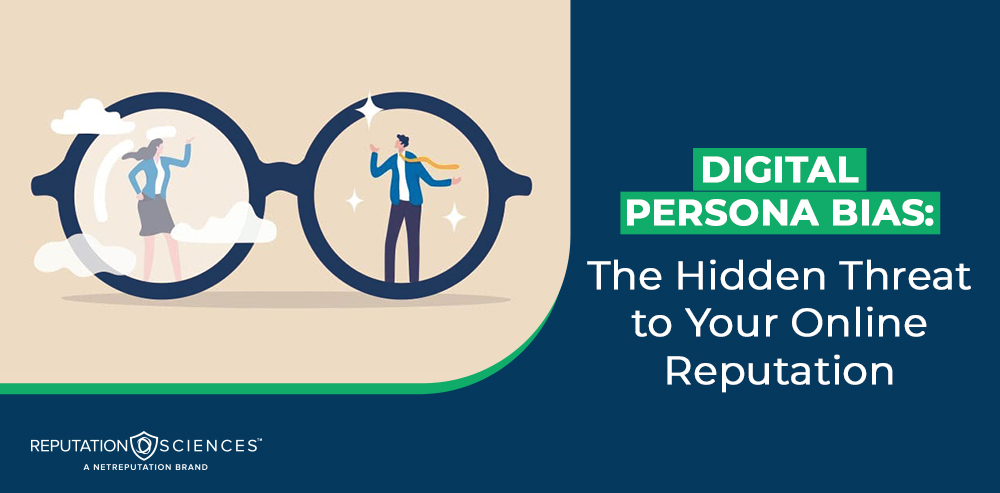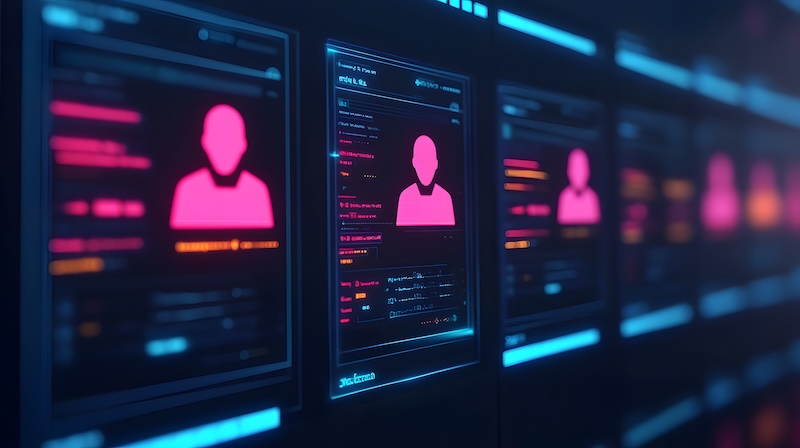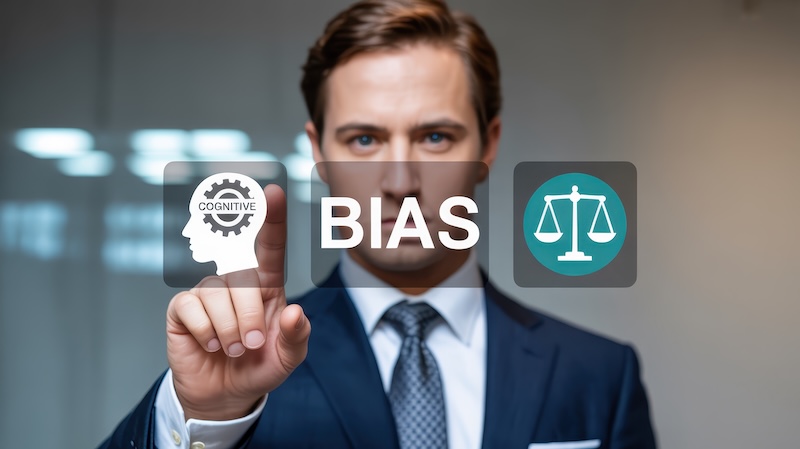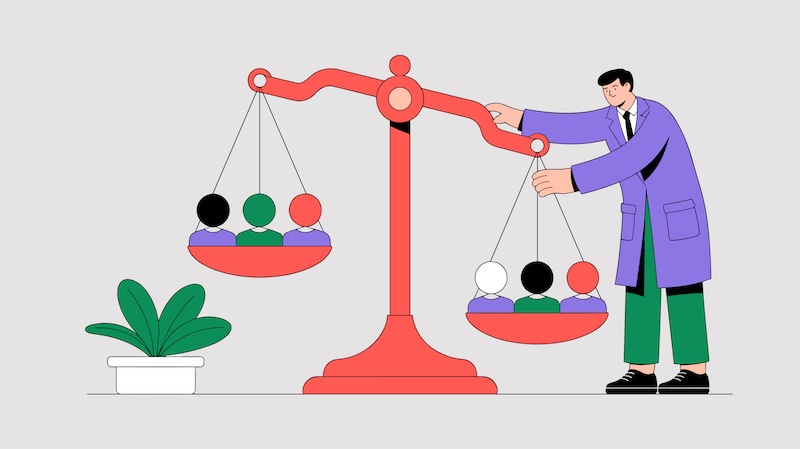Digital Persona Bias: The Hidden Threat to Your Online Reputation

This article explains digital persona bias and how you can protect your online reputation.
In today’s digital landscape, the online presence of every individual or brand is integral to their identity.
However, many people and business owners may not realize that their digital persona is not void of biases. Biases — subconscious tendencies that influence decision-making and perceptions — also significantly shape digital personas.
Understanding how biases operate digitally is essential for navigating the online realm effectively.
Online biases stem from various cognitive biases affecting information processing. Some common biases that shape our digital persona include:
- Anchoring bias
- Availability bias
- Confirmation bias
- Implicit bias
- Stereotyping
Confirmation bias, for example, leads us to seek information that confirms our existing beliefs, while availability bias makes us favor readily available information. These biases and others contribute to forming our digital persona, which can have far-reaching consequences.
By understanding and actively addressing biases online, we can navigate the digital realm with greater self-awareness, open-mindedness, and inclusivity, resulting in a digital persona that’s more reflective of our true selves.
Do you need help with your public persona? Call us at (844) 458-6735 for an in-depth audit and valuable insights from an expert.
Why Is It Important To Understand Biases on Digital Personas?

The consequences of biases on our digital persona are manifold. They result in limited perspectives and narrow information consumption, reinforcing prejudices and discrimination.
Biases can also lead to an inaccurate reflection of our identity and authenticity online. They facilitate the creation of internet filter bubbles, reinforcing our beliefs while excluding differing viewpoints.
To overcome and mitigate biases in the digital space, it is crucial to employ strategies that promote awareness, diversity, critical thinking, empathy, and inclusivity. We can actively work to counter bias influence by increasing awareness.
Actively seeking different perspectives and information; engaging in critical thinking, research, and fact-checking; building empathy and cultural sensitivity; and promoting inclusive and responsible digital practices are all effective strategies to mitigate biases and foster a more balanced and authentic digital persona.
How Biases Shape Your Digital Persona

Your digital persona is not an accident. It’s a reflection of the biases that shape it.
In this section, we’ll delve into the powerful influence of biases and uncover how they mold your digital identity. From the sway of confirmation bias and the weight of availability bias to the role of anchoring bias and the effects of stereotyping and implicit bias, we’ll explore how biases leave an indelible mark on your online self.
Get started today with online reputation management or repair. Give us a call at (844) 458-6735 to learn more.
The Impact of Confirmation Bias
Confirmation bias can have a significant impact on your digital persona. It refers to the tendency to seek, interpret, or remember information in a way that confirms one’s existing beliefs or biases.
The impact of confirmation bias can be seen in the reinforcement of closed information loops, where individuals only consume content that supports their viewpoints. This limits their exposure to different perspectives.
Recognizing and overcoming confirmation bias is essential for developing a well-rounded and informed digital presence.
The Influence of Availability Bias
Availability bias is a cognitive bias that occurs when people rely on information that is readily available to them rather than considering all relevant information. Here are a few different types of availability bias:
- Confirmation Bias: When we encounter information that confirms our existing beliefs, we tend to give it more weight, reinforcing availability bias.
- Filter Bubbles: Algorithms personalize and prioritize content based on our preferences, limiting exposure to new perspectives and perpetuating availability bias.
- Information Overload: We are bombarded with a vast amount of information online, making it challenging to sift through and identify biases.
- Media Influence: Biased news coverage and social media posts are often memorable and can shape our perceptions and beliefs.
Actively seeking out diverse sources and perspectives, fact-checking information, and engaging in critical thinking can help mitigate the influence of availability bias.
The Role of Anchoring Bias
Anchoring bias is a significant cognitive bias where individuals heavily rely on the first piece of information they receive when making decisions.
This cognitive bias can have a profound impact on how we perceive and interpret information in the digital world. By anchoring our beliefs to that initial piece of information, we limit our perspective, strengthen existing beliefs, and hinder our ability to consider and assess alternative viewpoints.
Recognizing and understanding the role of anchoring bias is crucial for developing more objective and well-rounded digital personas.
The Effects of Stereotyping and Implicit Bias
Stereotyping and implicit biases can profoundly impact your digital persona. They can perpetuate harmful stereotypes, reinforce prejudices, and contribute to discrimination.
These biases also result in a limited perspective and narrow information, ultimately creating self-reinforcing narratives.
Overcoming and mitigating biases in the digital space requires increasing awareness, seeking new perspectives, engaging in critical thinking, promoting empathy, and practicing inclusive and responsible digital behavior.
The Consequences of Biases on Your Digital Persona

There are a number of ways that biases can impact your individual identity online. Let’s go over the biggest risks.
Limited Perspective and Narrow Information
Biases can significantly constrain one’s perspective and restrict the information they encounter.
Social platform algorithms and filters, which are prevalent in our online lives, often reinforce preexisting beliefs and amplify our biases, ultimately limiting our viewpoints. Similarly, engaging exclusively with like-minded individuals can limit the range of ideas we’re exposed to. This narrows our perspective and restricts the information we receive.
Reinforcement of Prejudices and Discrimination
The occurrence of biases in the digital space reinforces prejudices and discrimination, resulting in significant consequences. Stereotypes and discriminatory attitudes can be perpetuated by these biases, thereby creating divisions and barriers online.
To address this issue, it is vital for individuals to actively seek unique perspectives, engage in critical thinking, and promote inclusive and responsible digital practices. These concerted efforts can help foster a more inclusive and equitable online environment, mitigating the risk of reinforcing prejudices and discrimination.
Inaccurate Reflection of Identity and Authenticity
Biases can lead to an inaccurate reflection of one’s identity and authenticity. These biases, such as stereotypes and implicit biases, shape how others perceive us online.
It’s important to be aware of these biases and actively seek new perspectives to mitigate their impact. Building empathy and promoting inclusive digital practices can help create a more authentic digital persona.
Creation of Information Bubbles
Echo chambers and filter bubbles are created in the digital space when individuals are only exposed to information and opinions that align with their existing beliefs and perspectives. This can lead to a limited and one-sided view of the world, reinforcing biases and inhibiting the exploration of diverse ideas.
For example, social media algorithms that prioritize content based on user preferences can inadvertently contribute to a closed loop of information. A person who only follows accounts that share their political views may find themselves surrounded by like-minded individuals, reinforcing their beliefs and making it difficult to consider alternative perspectives.
Strategies to Overcome and Mitigate Biases in the Digital Space

We can reshape our digital personas by diving into strategies to overcome and mitigate biases in the digital space, such as:
- Actively seeking different perspectives
- Engaging in critical thinking
- Increasing awareness
- Recognizing biases
By building empathy and cultural sensitivity, along with promoting inclusive and responsible digital practices, we can navigate the digital space with greater security, integrity, and fairness.
Our team of ORM experts can help you create the online presence you deserve. Contact us at (844) 458-6735 for more information.
Increasing Awareness and Recognizing Biases
Increasing awareness and recognizing biases are paramount when navigating the digital world. By actively educating ourselves and being mindful of our biases, we can make more informed decisions and engage in critical thinking. This process helps us avoid the dangers of misinformation and guarantees that our digital personas truly represent who we are.
Actively Seeking Diverse Perspectives and Information
Actively seeking unique perspectives on technology and information is crucial in overcoming biases in the digital space. Here are a few ways to do that:
- Follow people from different backgrounds on social media and other online platforms.
- Read news from various sources, fact-check information and conduct further research.
- Engage in discussions with people who hold different opinions.
- Explore different cultures and belief systems through books, documentaries, podcasts, social media profiles, and more.
As you follow the above tips, remember to stay open-minded and be willing to challenge your own biases.
Engaging in Critical Thinking and Fact-Checking
Critical thinking and fact-checking are vital for effectively navigating the online world. It enables us to question information, validate data sources, and prevent misinformation dissemination. By carefully analyzing evidence and actively seeking trustworthy sources, we can make well-informed decisions and safeguard ourselves from the influence of biases.
Building Empathy and Cultural Sensitivity
Building empathy and cultural sensitivity is a vital aspect of ethically navigating the digital world. By doing so, we can grasp and appreciate diverse perspectives, fostering inclusivity and reducing bias in human beings. By actively engaging with various communities, learning about their experiences, and respecting their cultural values, we can establish a more harmonious digital environment for all individuals.
Promoting Inclusive and Responsible Digital Practices
Promoting inclusive and responsible digital practices is crucial in mitigating biases online. To create a more inclusive and harmonious digital environment for all users, fostering open dialogue, encouraging a range of perspectives, and respecting others’ identities and opinions are essential.
Manage Your Digital Persona With Professional Help

The way you’re perceived online matters, and a poor online reputation can damage your personal life and your professional opportunities.
To surmount the constraints of digital persona biases, individuals can take proactive steps to expand their horizons:
- Actively seek out diverse perspectives and engage with individuals with differing viewpoints. This will broaden your perspective and let you access more information.
- Verify information from multiple sources to avoid an overreliance on biased outlets. This helps prevent the development of a limited perspective and restricted information access.
- Challenge your biases and maintain an open-minded approach to changing your perspective. This can help you break the cycle of having a limited outlook.
- Expand your digital network to include contacts with diverse backgrounds and experiences. Doing so will give you more access to a varied information landscape.
- Engage in discussions and debates to enhance your understanding of various viewpoints. This will free you from a constrained perspective and help you gain access to multiple sources of information.
At ReputationSciences.com, we work with clients who are ready to create, grow or repair their digital reputation. Whether you’re prioritizing your personal or professional online reputation, our team of experts and tailored services can help.
Find out how to create the online reputation you deserve by calling (844) 458-6735 today.
